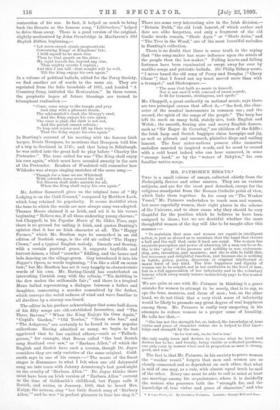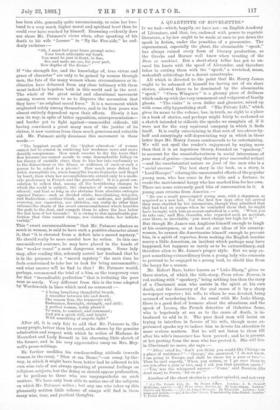MR, PATMORE'S ESSAYS.* 1 THIS is a small volume of
essays, collected chiefly from the Fortnightly Review and other sources. They are on various subjects, and are for the most part detached, except for the religious standpoint from the Roman Catholic point of view, which links them together. In his essay on "The Weaker Vessel," Mr. Patmore undertakes to teach men and women, but more especially women, their right places in the scheme of the Universe, and to show cause why they should be very thankful for the position which he believes to have been assigned to them ; but we are doubtful whether the more thoughtful women of the day will like to be taught after this m anner :— " To maintain that man and woman are equals in intelligent action, is just as absurd as to maintain that the hand that throws a ball and the wall that casts it back are equal. The woman has exquisite perception and power of admiring all a man can be or do. She is the 'glory' of his prowess and nobility in war, statesman- ship, arts, invention, and manners ; and she is able to fulfil this, her necessary and delightful function, just because she is nothing in battle, policy, poetry, discovery, or original intellectual or moral force of any kind. The true happiness and dignity of woman are to be sought, not in her exaltation to the level of man, but in a full appreciation of her inferiority and in the voluntary honour which every manly nature instinctively pays to the weaker vessel."
We are quite at one with Mr. Patmore in thinking it a grave mistake for women to attempt to be manly, that is to say, to ape the tone, manners, and dress of men ; but, on the other hand, we do not think that a very vivid sense of inferiority would be likely to promote any great degree of real happiness among them. Mr. Patmore is really very unsparing in his attempts to reduce woman to a proper sense of humility. He tells her that,— " She has not the strength for, or, indeed, the knowledge of, true virtue and grace of character unless she is helped to that know- ledge and strength by the man.
' He for God only, the for God in him.'
She only really loves and desires to become what he loves and desires her to be; and beauty, being visible or reflected goodness, can only exist in woman when and in proportion as man is strong, good, and wise."
The fact isthat Mr. Patmore, in his anxiety to prove woman the "weaker vessel," forgets that men and women are so closely connected and so dependent on each other, that what is said of one may, as a rule, with almost equal truth be said of the other. Every one must be able to call to mind at least one marriage among his acquaintance, where it is decidedly the woman who possesses both the "strength for, and the knowledge of, true virtue and grace of character," and who
* qigio Peette. AT. By Coventry Patmore. London: George Boll and Sons.
bas been able, generally quite unconsciously, to raise her hus- band to a very much higher moral and spiritual level than he could ever have reached by himself. Browning evidently does not share Mr. Patmore's views when, after speaking of his death to his wife "Leonor " in "By the Fire-side," he sud- denly exclaims :— "Oh, I must feel your brain prompt mine,
Your heart anticipate my heart, You must be just in front, in fine, See and make me see, for your part, New depths of the divine."
If "the strength for, and the knowledge of, true virtue and grace of character" are only to be gained by women through men, the fate of the many women whom circumstances or in. clination have debarred from any close intimacy with them must indeed be hopeless both in this world and in the next The whole of the great social and educational movement among women seems to us to disprove the accusation that they have "no original moral force." It is a movement which originated solely among themselves, and in its first years was almost entirely dependent upon their efforts. Slowly it has won its way, in spite of bitter opposition, misrepresentation— and harder yet to fight against—unmerciful ridicule, till having convinced a great many men of the justice of its claims, it now receives from them much generous and valuable aid. Mr. Patmore airily dismisses this movement in these words :— "The happiest result of the higher education' of woman cannot fail to consist in rendering her weakness more and more daintily conspicuous. How much sweeter to dry the tears that flow because one cannot accede to some demonstrable fallacy in her theory of variable stars, than to kiss her into conformity as to the dinner-hour or the fitness or unfitness of such-or-such a person to be asked to a pie-nic ! How much more dulcet the -dulctis Amarpidis ire, when Amaryllis knows Sopbocles and Hegel by heart, than when her accomplishments extend only to a mode- rate proficiency in French and the pianoforte ! It is a great con- solation to reflect that, among all the bewildering changes to which the world is subject, the character of woman cannot be altered; and that so long as she abstains from absolute outrages against Nature—such as divided skirts, free-thinking, tricycles, and Radicalism—neither Greek, nor conic sections, nor political economy, nor cigarettes, nor athletics, can really do other than enhance the charm of the sweet unreasonableness which humbles the gods to the dust, and compels them to adore the lace below the last hem of her brocade It is owing to this ineradicable per- fection that time cannot change, nor custom stale, her infinite variety."
This "sweet unreasonableness" that Mr. Patmore admires so much in woman, is said to have such a positive character about it, that "it is elevated from a defect into a sacred mystery."
He should really be more careful how he writes. In this one unconsidered sentence, he may have placed in the hands of the "weaker vessel" a most dangerous. weapon. Some lady may, after reading this, solemnly assure her husband that he is in the presence of a "sacred mystery" the next time he feels constrained to take her to task for being unreasonable; and what answer will he find to that ? Mr. Patmore would, perhaps, recommend the trial of a kiss, as the temporary cure for that "ineradicable perfection" that is irritating the poor man so sorely. Very different from this is the tone adopted by Wordsworth in lines which need no comment :— "A being breathing thoughtful breath,
A traveller between life and death : The reason firm, the temperate will, Endurance, foresight, strength, and skill; A perfect woman, nobly pla,nn'd To warn, to comfort, and command ; And yet a spirit still, and bright With something of angelic light."
After all, it is only fair to add that Mr. Patmore is, like many people, better than his creed, as he shows by the genuine admiration and respect with which he writes of Madame de Hautefort and Lady Russell in his charming little sketch of the former, and in his very appreciative essay on Mrs. Mey- nell's prose-writings.
He further modifies his condescending attitude towards women in the essay, "Dieu et ma Dame,"—an essay, by-the- way, in which it might have been better had he adhered to his own wise rule of not always speaking of personal feelings on religious subjects, lest the doing so should appear profanation, or be perilous to those who are unsympathetic on such matters. We have only been able to notice one of the subjects on which Mr. Patmore writes ; but any one who takes up this pleasantly written little volume of essays will find in them many wise, true, and poetical thoughts.



































 Previous page
Previous page